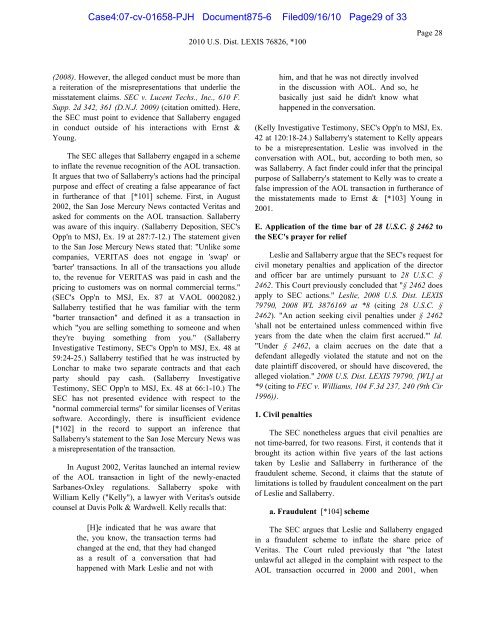exhibit 2 - SAP Lawsuit Portal
exhibit 2 - SAP Lawsuit Portal
exhibit 2 - SAP Lawsuit Portal
Create successful ePaper yourself
Turn your PDF publications into a flip-book with our unique Google optimized e-Paper software.
Case4:07-cv-01658-PJH Document875-6 Filed09/16/10 Page29 of 33<br />
(2008). However, the alleged conduct must be more than<br />
a reiteration of the misrepresentations that underlie the<br />
misstatement claims. SEC v. Lucent Techs., Inc., 610 F.<br />
Supp. 2d 342, 361 (D.N.J. 2009) (citation omitted). Here,<br />
the SEC must point to evidence that Sallaberry engaged<br />
in conduct outside of his interactions with Ernst &<br />
Young.<br />
The SEC alleges that Sallaberry engaged in a scheme<br />
to inflate the revenue recognition of the AOL transaction.<br />
It argues that two of Sallaberry's actions had the principal<br />
purpose and effect of creating a false appearance of fact<br />
in furtherance of that [*101] scheme. First, in August<br />
2002, the San Jose Mercury News contacted Veritas and<br />
asked for comments on the AOL transaction. Sallaberry<br />
was aware of this inquiry. (Sallaberry Deposition, SEC's<br />
Opp'n to MSJ, Ex. 19 at 287:7-12.) The statement given<br />
to the San Jose Mercury News stated that: "Unlike some<br />
companies, VERITAS does not engage in 'swap' or<br />
'barter' transactions. In all of the transactions you allude<br />
to, the revenue for VERITAS was paid in cash and the<br />
pricing to customers was on normal commercial terms."<br />
(SEC's Opp'n to MSJ, Ex. 87 at VAOL 0002082.)<br />
Sallaberry testified that he was familiar with the term<br />
"barter transaction" and defined it as a transaction in<br />
which "you are selling something to someone and when<br />
they're buying something from you." (Sallaberry<br />
Investigative Testimony, SEC's Opp'n to MSJ, Ex. 48 at<br />
59:24-25.) Sallaberry testified that he was instructed by<br />
Lonchar to make two separate contracts and that each<br />
party should pay cash. (Sallaberry Investigative<br />
Testimony, SEC Opp'n to MSJ, Ex. 48 at 66:1-10.) The<br />
SEC has not presented evidence with respect to the<br />
"normal commercial terms" for similar licenses of Veritas<br />
software. Accordingly, there is insufficient evidence<br />
[*102] in the record to support an inference that<br />
Sallaberry's statement to the San Jose Mercury News was<br />
a misrepresentation of the transaction.<br />
In August 2002, Veritas launched an internal review<br />
of the AOL transaction in light of the newly-enacted<br />
Sarbanes-Oxley regulations. Sallaberry spoke with<br />
William Kelly ("Kelly"), a lawyer with Veritas's outside<br />
counsel at Davis Polk & Wardwell. Kelly recalls that:<br />
[H]e indicated that he was aware that<br />
the, you know, the transaction terms had<br />
changed at the end, that they had changed<br />
as a result of a conversation that had<br />
happened with Mark Leslie and not with<br />
2010 U.S. Dist. LEXIS 76826, *100<br />
him, and that he was not directly involved<br />
in the discussion with AOL. And so, he<br />
basically just said he didn't know what<br />
happened in the conversation.<br />
(Kelly Investigative Testimony, SEC's Opp'n to MSJ, Ex.<br />
42 at 120:18-24.) Sallaberry's statement to Kelly appears<br />
to be a misrepresentation. Leslie was involved in the<br />
conversation with AOL, but, according to both men, so<br />
was Sallaberry. A fact finder could infer that the principal<br />
purpose of Sallaberry's statement to Kelly was to create a<br />
false impression of the AOL transaction in furtherance of<br />
the misstatements made to Ernst & [*103] Young in<br />
2001.<br />
E. Application of the time bar of 28 U.S.C. § 2462 to<br />
the SEC's prayer for relief<br />
Leslie and Sallaberry argue that the SEC's request for<br />
civil monetary penalties and application of the director<br />
and officer bar are untimely pursuant to 28 U.S.C. §<br />
2462. This Court previously concluded that "§ 2462 does<br />
apply to SEC actions." Leslie, 2008 U.S. Dist. LEXIS<br />
79790, 2008 WL 3876169 at *8 (citing 28 U.S.C. §<br />
2462). "An action seeking civil penalties under § 2462<br />
'shall not be entertained unless commenced within five<br />
years from the date when the claim first accrued.'" Id.<br />
"Under § 2462, a claim accrues on the date that a<br />
defendant allegedly violated the statute and not on the<br />
date plaintiff discovered, or should have discovered, the<br />
alleged violation." 2008 U.S. Dist. LEXIS 79790, [WL] at<br />
*9 (citing to FEC v. Williams, 104 F.3d 237, 240 (9th Cir<br />
1996)).<br />
1. Civil penalties<br />
The SEC nonetheless argues that civil penalties are<br />
not time-barred, for two reasons. First, it contends that it<br />
brought its action within five years of the last actions<br />
taken by Leslie and Sallaberry in furtherance of the<br />
fraudulent scheme. Second, it claims that the statute of<br />
limitations is tolled by fraudulent concealment on the part<br />
of Leslie and Sallaberry.<br />
a. Fraudulent [*104] scheme<br />
Page 28<br />
The SEC argues that Leslie and Sallaberry engaged<br />
in a fraudulent scheme to inflate the share price of<br />
Veritas. The Court ruled previously that "the latest<br />
unlawful act alleged in the complaint with respect to the<br />
AOL transaction occurred in 2000 and 2001, when


